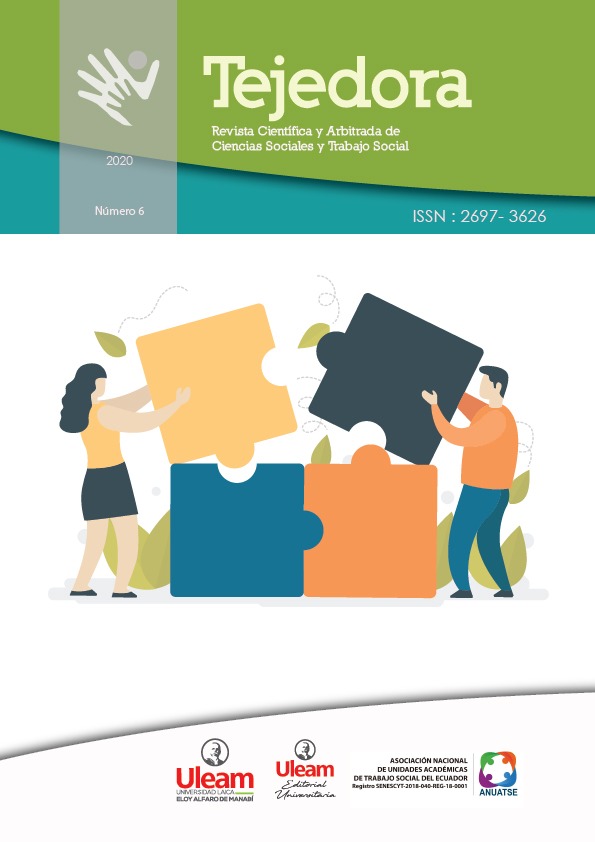Psychosocial risks of covid-19 in the teachers of the lev vigotsky educational unit, year 2021
DOI:
https://doi.org/10.56124/tj.v6i12ep.0110Keywords:
Psychosocial risks, Pandemic, COVID-19, Teachers, Educational unitAbstract
Carrying out this research was considered important since the COVID-19 pandemic has had a series of effects on a global scale, but in this case it was decided to analyze the psychosocial risks in teachers, since they comprise a very important population in the transformation of students. The developed topic was determined psychosocial risks of COVID19 in the teachers of the Lev Vygotsky Educational Unit. The methodology used was the mixed approach, the population consisted of 38 collaborators of which, through the simple random sampling method, a sample of 23 collaborators was chosen from whom surveys were carried out that consisted of 9 standardized questions, in addition 3 were chosen more people to conduct an interview that consisted of 4 open questions. The findings were based on the rhythm of work and the development of competences, the psychosocial impact, on the nervousness due to the possibility of contagion, nervousness in the face of economic consequences, the family and social context was analyzed, if there has had a family member diagnosed, if A friend or acquaintance has died due to COVID-19. In addition, it was concluded that the psychosocial factors and risks caused by COVID-19 in the work of the teachers of the Lev Vygotsky
Educational Unit are fear and stress of contagion due to the possible return to face-to-face classes since some have pre-existing diseases, generated a certain level of stress to the degree that it is necessary to mention frustration since they do not have the necessary tools or resources
Downloads
References
Alban, G. P., Verdesoto Arguello, A. E., & Castro Molina, N. E. (01 de 07 de 2020).
Metodologías de investigación educativa (descriptivas, experimentales, participativas, y de investigación-acción). Revista Cientifica Muno de la Investigacion y el Conocimiento,
-173. Obtenido de file:///C:/Users/Lapto/Downloads/Dialnet-
MetodologiasDeInvestigacionEducativaDescriptivasEx-7591592.pdf
Arias, E. R. (2020). Investigacion de Campo. Economipedia, 3. Obtenido de https://economipedia.com/definiciones/investigacion-de-campo.html
Asamblea Nacional. (20 de octubre de 2008). Constitucion del Ecuador. Obtenido de
Constitucion del Ecuador: https://www.wipo.int/edocs/lexdocs/laws/es/ec/ec030es.pdf
Cabieses, B., Darrigrandi, F., Blukacz, A., Obach, A., & Silva, C. (2021). Migrantes venezolanos frente a la pandemia de COVID-19 en Chile: factores asociados a la percepción de sentirse preparado para enfrentarla. CEPAL, 42-62. Obtenido de https://repositorio.cepal.org/bitstream/handle/11362/46554/20-
_LDN111_02_Cabieses.pdf?sequence=1&isAllowed=y
CEPAL. (2020). La educación en tiempos de la pandemia de COVID-19. Ginebra: CEPAL. Obtenido de https://repositorio.cepal.org/bitstream/handle/11362/45904/1/S2000510_es.pdf
Gómez, L. A. (2020). Factores de riesgo psicosocial asociados a los profesores del Instituto San
Pablo Apóstol (ISPA) durante la pandemia presentada por el COVID - 19. Colombia:
Escuela Colombiana de Carreras Industriales - ECCI. Obtenido de https://repositorio.ecci.edu.co/bitstream/handle/001/1573/Trabajo%20de%20grado.pdf?se quence=1&isAllowed=y
Hernández-Sampieri, R. (2020). METODOLOGIA DE LA INVESTIGACIÓN: LAS RUTAS
CUANTITATIVA, CUALITATIVAY MIXTA. Mexico: McGRAW-HILL INTERAMERICANA EDITORES, S.A. de C. V. Obtenido de http://www.biblioteca.cij.gob.mx/Archivos/Materiales_de_consulta/Drogas_de_Abuso/A rticulos/SampieriLasRutas.pdf
Hoyos, C. P., Camargo Buitrago, G. P., & Escobar Meléndez, L. V. (2020). Identificación del impacto psicosocial en los trabajadores de la educación por Sars-coV-2. Bogotá: Universidad ECCI. Obtenido de https://repositorio.ecci.edu.co/bitstream/handle/001/965/Identificaci%C3%B3n%20del%
impacto%20psicosocial%20en%20los%20trabajadores%20de%20la%20educaci%C3
%B3n%20por%20Sars-coV-
%20en%20dos%20colegios%20p%C3%BAblicos%20de%20Bogot%C3%A1%20D.C..
pdf?sequence
Huamán, D. R., & Tacca Huamán, A. L. (12 de 2019). Factores de riesgos psicosociales y estrés percibido en docentes universitarios. Propósitos y Representaciones, 7(3), 323 - 353.
Obtenido de http://www.scielo.org.pe/pdf/pyr/v7n3/a13v7n3.pdf
López-Roldán, P., & Fachelli, S. (2015). METODOLOGÍA DE LA INVESTIGACIÓN SOCIAL CUANTITATIVA. Barcelona: Universitat Autònoma de Barcelona. Obtenido de https://ddd.uab.cat/pub/caplli/2016/163567/metinvsoccua_a2016_cap2-3.pdf
M. Argandoña, E. Ayón, R. García, Y. Zambran & M. Barcia. (22 de 07 de 2020). Polo del Conocimiento. Obtenido de La educación en tiempo de pandemia. Un reto
Psicopedagógico para el docente: https://polodelconocimiento.com/ojs/index.php/es/article/download/1553/2911
Meneses, J. (2016). El cuestionario. Obtenido de femrecerca:
https://femrecerca.cat/meneses/publication/cuestionario/cuestionario.pdf
Mosquera, R., Castrillón, O., & Parra, L. (08 de 2018). Predicción de Riesgos Psicosociales en
Docentes de Colegios Públicos Colombianos utilizando Técnicas de Inteligencia
Artificial. Universidad Nacional de Colombia, Universidad Libre, Seccional Bogotá, 29(4), 267-279. Obtenido de https://scielo.conicyt.cl/pdf/infotec/v29n4/0718-0764infotec-29-04-00267.pdf
Nacional, A. (2020). Acuerdo Ministerial. Quito: Asamblea Nacional. Obtenido de https://www.salud.gob.ec/wp-content/uploads/2020/03/SRO160_2020_03_12.pdf
OIT-OMS. (2019). Riesgo psicosocial. OIT-OMS, 3. Obtenido de http://www.observatorioriesgospsicosociales.com/que-es-un-riesgo-psicosocial
Párraga, L. E., Vargas Párraga, V. M., Cedeño Cevallos, L. M., & Piloso Gómez, D. T. (2020).
Riesgos psicosociales y la educación pública en la Pandemia. Caso Ecuador. centrosureditorial, 5(1), 8. Obtenido de http://www.centrosureditorial.com/index.php/revista/article/view/102/292
Placencia, C. T.-P. (30 de 10 de 2016). Entrevista: guía práctica para la recolección de.
Obtenido de scielo: http://www.scielo.org.co/pdf/rfmun/v65n2/0120-0011-rfmun-65-02-
Roberto, M. P. (2012). METODOLOGÍA DE LA INVESTIGACIÓN. Lima: UNIVERSIDAD NACIONAL DE EDUCACIÓN ENRIQUE GUZMÁN Y VALLE. Obtenido de
http://www.une.edu.pe/Sesion04-Metodologia_de_la_investigacion.pdf
Santos, B. M., Ribeiro, S., Scorsolini-Comin, F., & Barcellos Dalri, R. (01 de 2021). Ser docente en el contexto de la pandemia de COVID-19: reflexiones sobre la salud mental.
Departamento de Enfermagem Psiquiátrica e Ciências Humanas, 29(3), 137-141.
Obtenido de https://scielo.isciii.es/scielo.php?script=sci_arttext&pid=S1132-
Solórzano, S. E., Delgado Molina, J. B., Quimi Cobos, L. S., & Bravo Bonoso, D. G. (2020).
Seguridad y salud ocupacional en el teletrabajo docente. Universidad Estatal Del Sur de Manabí, 25. Obtenido de https://ciencialatina.org/index.php/cienciala/article/view/890/1224
UNESCO. (2021). Docentes. UNESCO, 3. Obtenido de https://es.unesco.org/themes/docentes
Viñals Blanco, A., & Cuenca Amigo, J. (08 de 2016). El rol del docente en la era digital. Revista Interuniversitaria de Formación del Profesorado, 30(2), 103-114. Obtenido de https://www.redalyc.org/pdf/274/27447325008.pdf
Published
How to Cite
Issue
Section
License
Copyright (c) 2024 Revista Científica y Arbitrada de Ciencias Sociales y Trabajo Social: Tejedora. ISSN: 2697-3626

This work is licensed under a Creative Commons Attribution-NonCommercial-ShareAlike 4.0 International License.






















